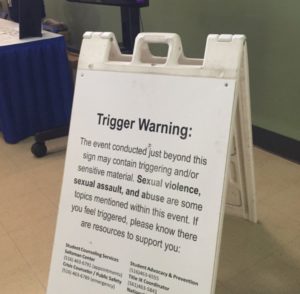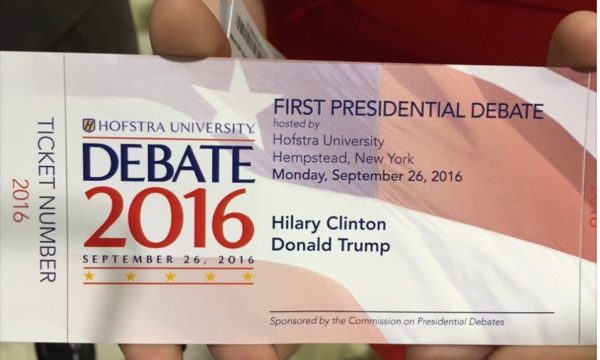If you want to know just how crazy things are, consider that Hofstra University, host of tonight’s debate, has posted a “trigger warning” outside because some Hofstra students might find the content of the debate traumatizing. And just who do you think will do the triggering? I suppose if Hillary collapses on stage (is Lloyd’s quoting odds, or any Las Vegas bookmakers taking bets?) I suppose liberals will be traumatized, but I’m sure the thinking is that Trump might say something mean.
Meanwhile, I was surprised to learn that the record largest debate audience is still the 1980 debate between Reagan and Jimmy Carter—and that was back when the country’s population was about a third smaller than it is today. I’m not quite sure what is the methodology that leads everyone to predict that tonight’s debate will have a record audience of around 100 million (versus 80 million in 1980) beyond the obvious fascination with Trump, but I think one parallel is obvious: in 1980, lots of undecided or tentative voters wanted to know if Reagan was the madman the media made him out to be. But once he said, There you go again. . . it was all over. Voters decided that he was safe after all. Which suggests Trump has the most room in this debate for a breakout. Hillary is well known, and people don’t like her. She’s the “safe” choice if Trump is a loon. If people decide Trump isn’t crazy, he’s going to gain out of the debate. I expect he might say something like this with a smile: “Given your record in office, I think the voters ought to say, ‘You’re fired.'”
There are other ways this debate might be an echo of 1980. Here’s my account of it from The Age of Reagan, and you can make out parallels and similarities for yourself:
For the media, it might as well have been the Super Bowl. Walter Cronkite introduced the debate by saying, “It’s not inconceivable that the election could turn on what happens in the next 90 minutes.” Carter won the coin toss, and opted to let Reagan answer the first question, which turned out to be about war and peace. Carter’s strategists believed that Reagan might be nervous and stumble out of the starting gate. Reagan was a little halting and hesitant, but got out a pre-planned answer emphasizing that “our first priority must be world peace,” and including his refrain about having seen four wars in his lifetime and not wishing to see another. Lou Cannon quipped that “Reagan mentioned ‘peace’ so often it sounded like he had invented the word.” Reagan soon settled into a relaxed rhythm for the rest of the debate, accomplishing his most important objective: he reassured viewers that he was not a “mad bomber.”
Carter, on the other hand, appeared stiff and uptight throughout. Washington Post columnist Mary McGrory wrote: “Carter seemed stricken with nerves, so tense that he looked affronted when Reagan bounded over to shake hands before the hostilities began.” Carter hit Reagan hard on Reagan’s “out of the mainstream” views, and six times used the adjective “disturbing” to describe Reagan’s policies. Conversely, Carter kept saying “Oval Office” as though he thought viewers might have forgotten that he was President. Reagan parried effectively, though a strict scoring of the debate would have awarded Carter points for consistently putting Reagan on the defensive.
The public, of course, does not judge presidential debates by careful scoring of points and counter-points. The demeanor and bearing of the candidates counts as much, if not more, than the substance of the debate. The relaxed and confident Reagan showed some of his quickness and instinct for the cut and thrust of debate, especially during the argument over his economic plan. Carter repeated his charge that it would be inflationary. Reagan answered with a rhetorical question that focused viewers on his broader philosophical point about government: “I would like to ask the President why it is inflationary to let the people keep more of their money and spend it the way they like, and it isn’t inflationary to let him take that money and spend it the way he wants?” Reagan also hoist Carter by his own petard. In 1976, Carter had blasted Ford with the “misery index,” the combination of inflation and unemployment. In 1976, Carter’s “misery index” was 12.5, and Carter had said “that no man with that size misery index had a right to seek reelection to the presidency.” Today, Reagan observed, the misery index is over 20.
Carter never did loosen up. One of Carter’s own aides observed that in the TV cutaway shots showing Carter while Reagan was speaking, “Jimmy looked like he was about to slug him.” Carter’s one attempt at humanizing himself was a disaster. About two-thirds of the way through the debate, at the close of several questions about foreign policy and arms control, Carter said: “I had a discussion with my daughter Amy the other day, before I came here, to ask her what the most important issue was. She said she thought nuclear weaponry, and the control of nuclear arms.” Reagan’s line about having sons and a grandson had gone over fine, but Carter’s line, delivered in a rapid-fire staccato burst, landed with a thud, and became a source of ridicule against Carter over the next week. Republican groups were quick with a bumper sticker: “Ask Amy, She Knows.”
Carter then unwittingly set up one of the most famous lines of Reagan’s career. “Governor Reagan,” Carter charged, “began his political career campaigning around this nation against Medicare,” and now Reagan was opposing any steps toward national health insurance. The camera swung to Reagan for his reply. Reagan nodded his head at Carter, and said with a slight smile: There you go again. Reagan’s formal answer that followed didn’t really matter. There you go again seemed to sum up both Reagan’s easy-going character and the overreach of Carter’s relentless attacks on Reagan’s supposed extremism. It may well stand the test of time as the most memorable line of any presidential debate. (The Washington Post transcript of the debate curiously omitted “There you go again.”)
But Reagan saved his toughest blow at Carter for the end. In his closing comment, Reagan said:
Next Tuesday all of you will go to the polls, will stand there in the polling place and make a decision. I think when you ask that decision, it might be well if you ask yourself, are you better off than you were four years ago? Is it easier for you to go and buy things in the stores than it was four years ago? Is there more or less unemployment in the country than there was four years ago? Is America as respected throughout the world as it was? Do you feel your security is safe, that we’re as strong as we were four years ago? And if you answer all those questions ‘yes,” why then, I think you choice is very obvious as to whom you will vote for. If you don’t agree, if you don’t think that his course that we’ve boon on for the last four years is what you would like to see us follow for the next four, then I could suggest another choice that you have.
David Gergen had suggested these lines to Reagan, and it was a devastating closer. Reagan, who had answered the first question, got in the last word.
Carter’s camp believed they won hands-down. “We won, we won,” Hamilton Jordan said immediately after the TV lights went down. So did much of the media, if only slightly. Hedrick Smith’s lead in the New York Times news story the next day said that “The Presidential debate produced no knockout blow, no disastrous gaffe and no immediate, undisputed victor,” though Smith gave the edge to Carter further down in the story. “If anyone gains politically from the Tuesday night matchup,” Morton Kondracke wrote in The New Republic, “it will be Carter. . . [B]y every measure except aw-shucks niceness, Carter was the clearly superior performer.”
The viewing public didn’t think so. Wirthlin conducted an overnight poll of 500 voters that found Reagan judged the winner by a two-to-one margin. Other polls by Lou Harris and the Associated Press found a similar result. The most controversial spin on the debate came from ABC News, who promoted a call-in phone poll after the debate on “Nightline.” Bell Labs, which facilitated the phone poll, expressed “shock” when over 600,000 people phoned in over the next hour, at a cost of 50 cents per call. The tabulation found Reagan the winner, again by a two-to-one margin. This self-selected phone-in “poll” was utterly unscientific and drew heavy criticism that it was no more accurate than the Literary Digest telephone poll in 1936 that predicted Alf Landon would defeat Franklin Roosevelt. Nevertheless, the poll took on a life of its own and received wide news coverage. (And Bell Labs made $300,000 on the deal.) “Whatever the poll’s shortcomings,” the New York Times suggested, “a margin that wide probably reflected something of substance about the debate’s impact.”
The Times was right, though it didn’t become clear until 48 hours before election day. Wirthlin’s tracking polls, based on more than 10,500 phone calls in the week after the debate, detected Reagan’s numbers moving up steadily, but public polls continued to find the race still to be within the margin of error—too close to call. Gallup reported the Sunday before the election: “Never in the forty-five year history of presidential election surveys has the Gallup poll found such volatility and uncertainty.” Pat Caddell’s daily tracking poll on Sunday found Reagan and Carter dead even, as did the New York Times/CBS poll. Caddell told Elizabeth Drew Sunday night, “I just wish we hadn’t debated.”
Wouldn’t surprise me at all if the course of the rest of this election hears a lot of echoes of this.


Notice: All comments are subject to moderation. Our comments are intended to be a forum for civil discourse bearing on the subject under discussion. Commenters who stray beyond the bounds of civility or employ what we deem gratuitous vulgarity in a comment — including, but not limited to, “s***,” “f***,” “a*******,” or one of their many variants — will be banned without further notice in the sole discretion of the site moderator.